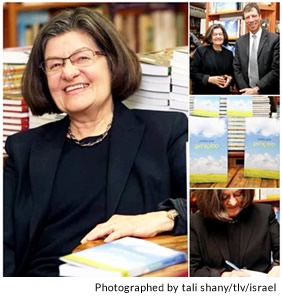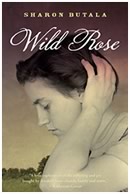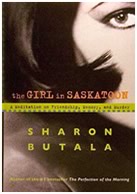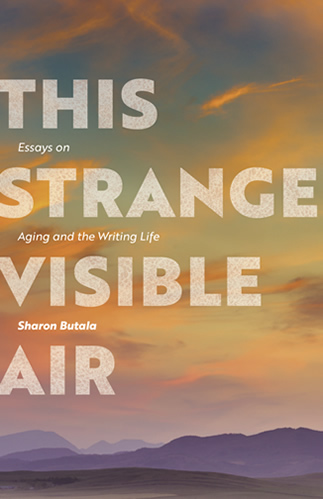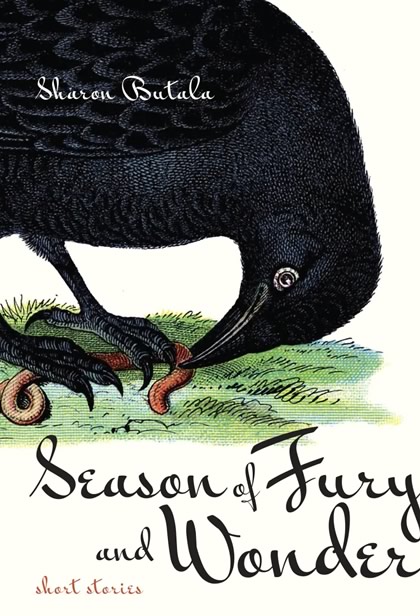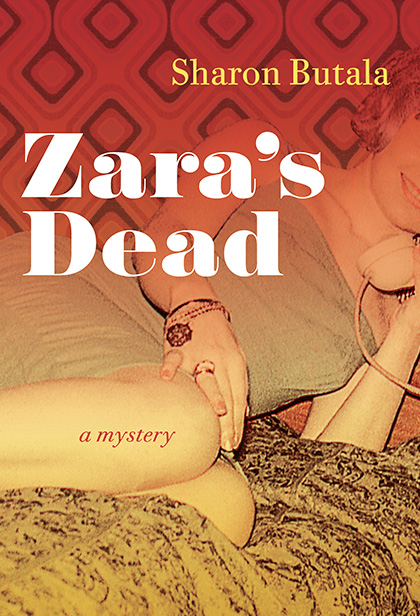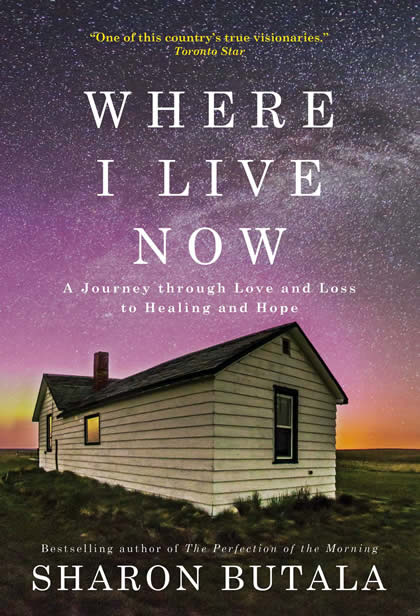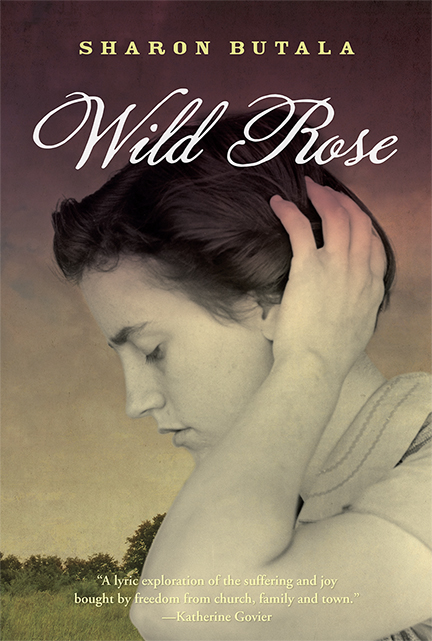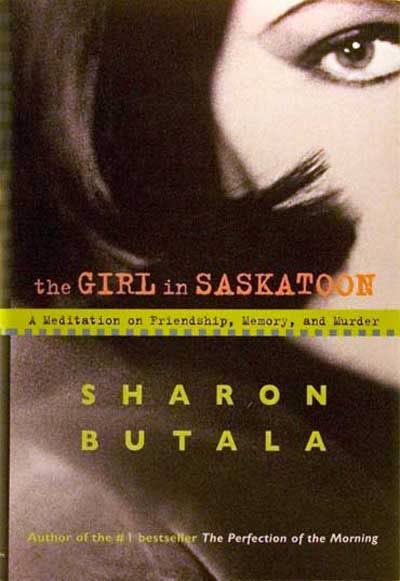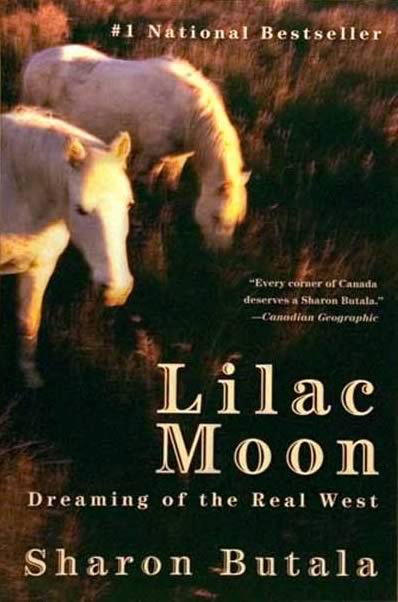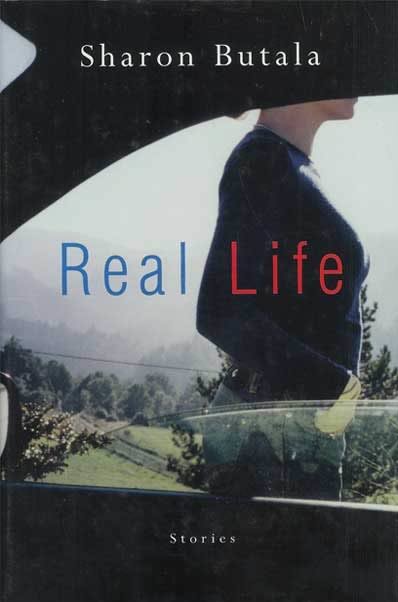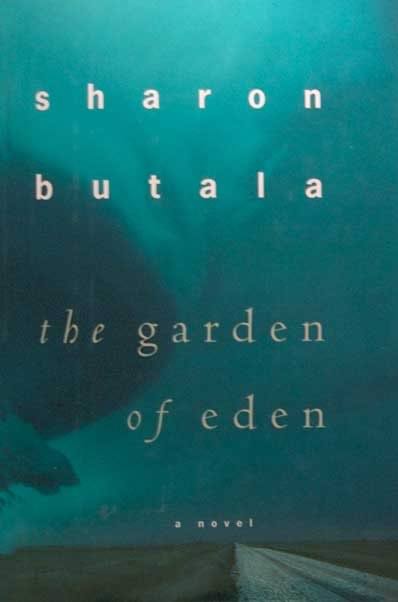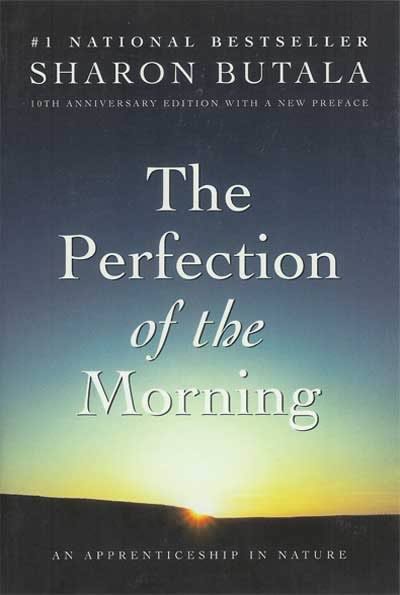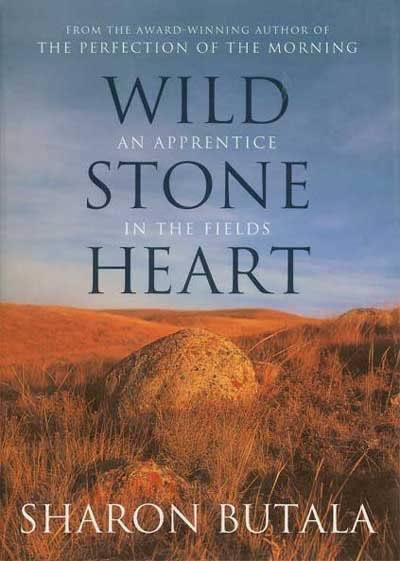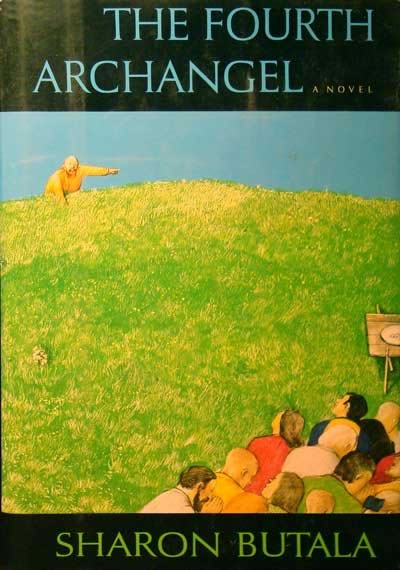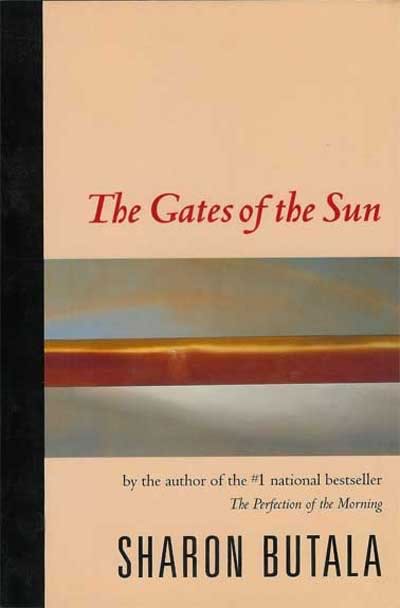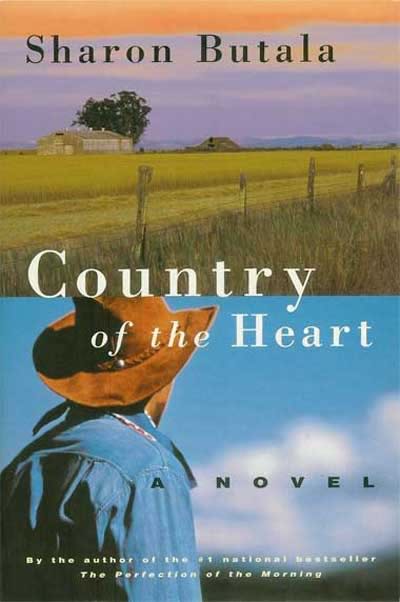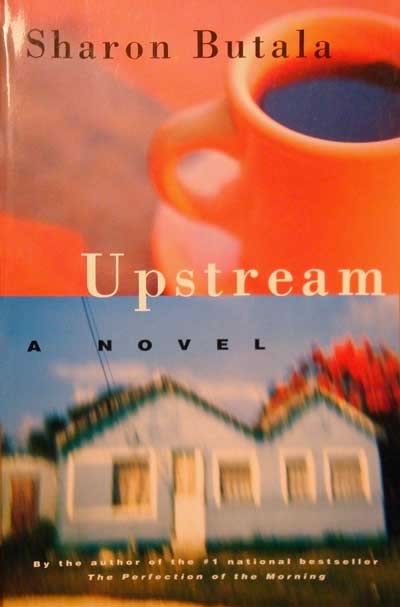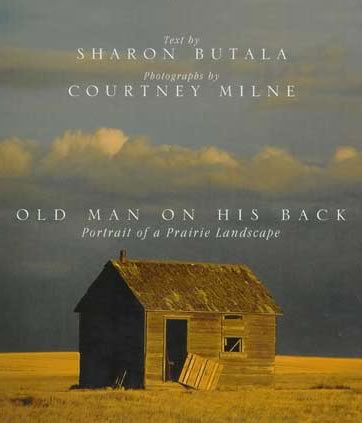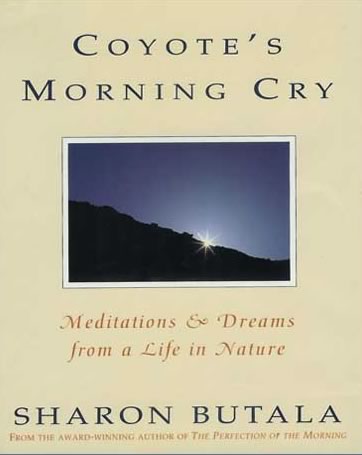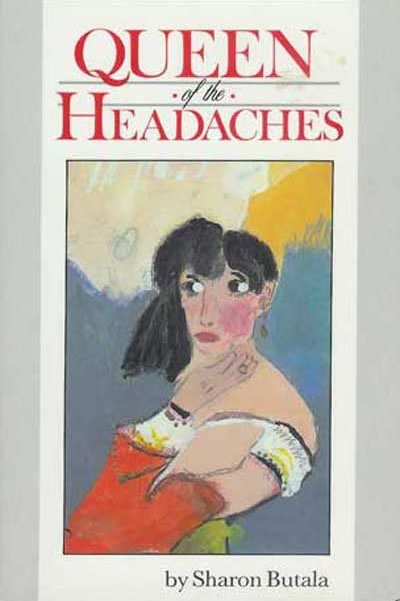RECENT WORK
Leaving Wisdom (Thistledown Press, June, 2023) In what is probably the last of her series of books on the culture and lives of the rural agricultural people of southwest Saskatchewan, especially the women, Butala has her protagonist return to the village of Wisdom from which, as a 15-year-old, she ran away. Now 65, two broken marriages behind her and mother of four grown daughters, a severe concussion forces her into returning, whereupon the unrecognized and refused reasons for that long-ago escape will be revealed, including the antisemitism, inter-generational trauma from the European past, and murder.
This Strange Visible Air (Freehand Books, 2021) In this incisive collection, Sharon Butala reflects on the ways her life has changed as she’s grown old. She knows that society fails the elderly massively, and so she tackles ageism and loneliness, friendship and companionship. She writes with pointed wit and acerbic humour about dinner parties and health challenges and forgetfulness and complicated family relationships and the pandemic — and lettuce. And she tells her story with the tremendous skill and beauty of a writer who has masterfully honed her craft over the course of her storied four-decade career. An elegant and expansive look at the complexities and desires of aging and the aged.
Season of Fury and Wonder - out on May 1st, 2019 - is a collection of short stories in which each protagonist is an old woman, each aged between seventy to one hundred. A theme is how the past infiltrates and informs the present whether wanted or not; another is how unconscious ageism blights the lives the old, and a third is what becomes of the dreams and desires of youth and how such longings transform and provide insight, even wisdom, in old age. ALSO, each story is a response to a 'great' short story or literary work of the 19th-20th century, from that of Hemingway, Munro, Carver, Joyce, Flannery O'Connor, Edna O'Brien, Chekhov, Poe and others.
Zara's Dead, Sharon's new novel, published in May, 2018. This is a mystery with Fiona, the protagonist, now seventy, still angry at the unsolved murder of a young woman with whom she once went to school many years earlier. Zara had been a beauty queen, a promising young woman who dreamt of great things for herself, all snatched away in a few savagery-filled moments, followed by an investigation that almost immediately stalled, then failed. Fiona wants to know why, and she still wants to know who did it. This latter information, when she finally finds it, will alter not only the lives of others, but her own life forever.
Where I Live Now, Sharon's latest memoir, published in April 2017. This memoir is about a life lived on the land in southwest Saskatchewan, both idyllic and difficult and which, after 33 years, ended with the death of Butala's husband. The book goes on from there to follow her through her grief, sorrow and many losses as a new widow, to her struggles to make a new life in the city. As well as offering solace and hope, this book inspires others making the same difficult but ultimately joyful journey.
Wild Rose, a novel, published in September 2015, is of the earliest part of the settlement era on the prairies, about Sophie, a young Quebecoise mother who finds she has to make her own way in what was then decisively a man’s world.
Wild Rose, an epic story of The West, now long gone, charts Sophie’s journey from underloved child in religion- bound rural Quebec, to headstrong young woman to exhausted homesteader to deserted bride and mother to independent businesswoman finding her way in a hostile, if beautiful, landscape. (Coteau Books)
To purchase
Wild Rose online, go to
Coteau Books
Wild Rose is available in bookstores.
Saskatchewan, a selection of Sharon’s stories, translated into Hebrew and launched in 2015, Tel Aviv, Israel, (Margena Publishing, 2015)
The Girl in Saskatoon: A Meditation on Friendship, Memory and Murder (HarperCollins, 2008), a nonfiction work about, among other things, the unsolved murder in Saskatoon, back in 1962, of a young woman with whom Butala attended high school. It was an event that shook the city to its core and which no one has been able to forget. Butala probes the background to this fact, and in this book, also examines a forward-looking pioneer society.
REVIEWS
Review: Sharon Butala captures indomitable spirit of the West in Wild Rose
Author of the article: Catherine Ford
Published Feb 13, 2016 • Last updated Feb 18, 2016 •
Sharon Butala.
There is only one word appropriate for Sharon Butala’s latest book: Beautiful. Wild Rose is simply beautiful.
No words of mine can do it justice because reading Wild Rose is a lock on your heart, a catch in your throat and best of all, a glimpse into the lives of our great-grandparents and every other immigrant to a wild and unforgiving land. The CPR may have “opened” the West, but it was those people who came to the ed of the line, or close to it, who took the promise of a new life and land and left everything and everybody they knew to be pioneers.
This is not the romanticized version told in hindsight, but the harsh reality of such a life. And, full disclosure — I devoured this book before Christmas, but could not find the appropriate words to review it. Then I decided that there was no way to find the perfect words but to be honest — I loved this book.
Wild Rose is not a new story, but it reads like one because it is told from a woman’s viewpoint. How refreshing is that? It is a reminder that of all the hard work to wrest a living from a harsh land, it was the pioneer women who held up at least half of that expanse of blue sky; maybe more, as they plowed an seeded and harvested and bore the children, too. Indeed, Butala dedicates the book “to the women who settled western Canada.”
Sophie Charron is young, naïve and in love. The “adventure” of heading west from their small Quebec village with her new husband, Pierre Hippolyte, means freedom from her unloving, cold grandparents, with whom she lives. It’s an escape from the rigid traditionalism and even more rigid life circumscribed by the Catholic Church. They travel by train to the flat expanse of Saskatchewan to claim their homestead by looking for the survey stakes. There is nothing else around for miles. Together. Sophie and Pierre clear the land, put up a one-room house and she bears a son, Charles.
So far, this is a familiar story. But Pierre disappears and in his place arrives the land speculator to whom Pierre haso sold everything out from under her. The law offers Sophie nothing; a real situation that was not rectified until after the Supreme Court of Canada ruled in the Murdoch vs Murdoch case in 1973 that a farm wife had no claim on land held solely in her husband’s name, regardless of the work she did throughout their marriage. Eventually, after an outcry across the country, the laws were changed. But all this would happen nearly 100 years after the fictional Sophie was left destitute. How she and toddler son survive is the true heart of the story.
In an interview published in The Herald, Butala (who now lives in Calgary) describes the genesis of the book as a realization that in her previous books, she had never told the women’s side of the settling of the west. “I thought I don’t think I have succeeded in telling the story about women who were like the women of my family. They suffered tremendous hardships and struggles but were never defeated by what happened to them, who never lost their dignity and who always remembered who they were and what they believed their lives stood for. I wanted to create a woman like that.”
Sophie is the woman she created. It’s tough to believe she isn’t real, especially when Sophie muses she “knew the women didn’t speak of freedom and she wondered what it was they did speak of: marriages, children, houses, gardens, not even of education. But she had wanted more than the things the women spoke of . . . she had grasped onto the word ‘freedom’ and taken it as her own.”
Had Sophie been a real person, I could imagine she would have caught the attention of best-selling author Margaret MacMillan whose 2015 Massey Lectures were turned into her new book, History’s People: Personalities and the Past. Sophie would fit right in with Nellie McClung and sisters Susanna Moodie and Catharine Parr Trail.
At one point in Wild Rose, Pierre says to Sophie: “You wanted the West didn’t you? Now you are the West.”
Indeed, particularly those of us who choose to live in the West, we are the West and Sharon Butala has captured the indomitable spirit not only of the pioneer women, but all the rest of us, too.
WILD ROSE by Sharon Butala (Couteau Books; $21.95; 395 pages)
(Catherine Ford is a retired Herald columnist.)
August 17, 2015 ~ Elaine Dewar, author of Smarts: The Boundary-Busting Story of Intelligence (Debonair[e]Books, Trade paperbacks, 2015)
“I read Wild Rose in the hospital while S. was being treated. This turned out to be wonderful: It took me immediately away from my own concerns to the prairies and into the life of Sophie, her grandparents, her brothers, her Pierre. It is in every way a page turner. There is something downright magical about the way the story unfolds from the present to the past and back again. I will read it again to see if I can see the change-ups coming, but it is so beautifully wrought that there are no seams, you’re just here with Sophie and there with her and right inside her skin. Loved the sense of place, the drive for freedom, the terrors of freedom. The thing that really got to me is Sophie’s sense of a spiritual reality, something quite separate from the rituals of the church. It’s a terrific read.”


